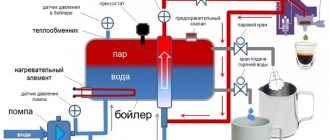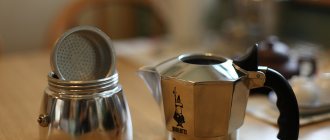Useful tips
You love coffee and can’t imagine a single morning without this invigorating drink.
. At the same time, you drink several cups a day, not paying attention to your well-being and the time of day.
Is it worth giving up this habit
, for example, during pregnancy? Is it possible to drink coffee before donating blood?
Since you won't find any warning labels on coffee packaging, we recommend reading this article
. Here you will find answers to these and some other questions.
Coffee is a source of antioxidants
Coffee contains 4 times more antioxidants than green tea.
In addition, roasting coffee beans does not reduce their quantity at all, but rather increases it.
Antioxidants eliminate damage from stray molecules - free radicals, which destroy DNA and harm the body's cells.
Free radicals cause premature aging, brain damage, affect the immune and nervous systems and cause other health problems, and coffee helps neutralize stray molecules and avoid all these troubles.
How much coffee can you drink
Is it possible to have coffee before donating blood?
A blood test, like a number of other tests, is a procedure that requires a certain preparation
. In particular, before donating blood, you should exclude from your diet a number of foods and drinks that may have a negative impact on the accuracy of the results.
Is coffee one of them?
Coffee is one drink that you definitely shouldn’t drink if you plan to donate blood. Moreover, according to the Rules for preparing patients for testing in the laboratory (an official document developed by the National Standard
Russian Federation) you should stop drinking coffee a few days before taking a blood test.
The reason for such a strict restriction is that the substances contained in coffee (especially caffeine) change the chemical composition of the blood. For example, you should give up caffeine 3 days before taking a biochemical blood test.
; at least 48 hours before a blood test to identify cancer markers, biologically active substances and hormones.
And here’s some information as an additional bonus: you should also give up coffee one day before taking a urine test
in the case when it is necessary to study the so-called catecholamines in the urine (adrenaline, norepinephrine, dopamine in urine).
By the way, all of the above applies equally (if not more!) to such a drink as black tea. Because if coffee beans contain caffeine
reaches 1.5 percent, then in tea leaves this figure is several times higher - up to 5 percent.
Coffee helps your liver, especially if you're a heavy drinker
In 2006, a study was published that included 125,000 people over 22 years of age. The results showed that people who drink at least one cup of coffee a day have a 20% reduced risk of liver cirrhosis.
Arthur Klatsky, lead author of the study, explained that coffee consumption confers protective effects against liver cirrhosis caused by alcohol consumption.
The more coffee a person consumes, the lower the risk of rapid progression to cirrhosis, hospitalization and death.
In addition, a study from the NUS Graduate Medical School found that coffee helps prevent the development of fatty liver disease. So, by drinking more than four cups of tea or coffee a day, you insure yourself against fatty liver disease.
Coffee and children
Can children have coffee?
Adults often ask the question: at what age can a child be given coffee? No special research has been carried out on this topic; no one has conducted tests on children. And all available official data
associated only with the consumption of caffeine contained in energy drinks and other products.
However, there are recommendations from experts
(in particular, recommendations from the same Federal Research Center for Nutrition, Biotechnology and Food Safety), according to which you can start drinking coffee no earlier than adolescence (15-16 years).
What are the limits on the amount of caffeine consumed for teenagers?
Researchers suggest caffeine may not cause noticeable side effects
in a healthy teenager, if he consumes it in the amount of 50-300 milligrams per day.
It should be noted that a lot depends on the teenager’s build - children with low body weight are more susceptible to caffeine. At the same time, there are research results
, in which a small group of adolescents showed behavioral changes when consuming caffeine.
Isolated cases of excessive caffeine consumption by adolescents through other products
. They give some scientists reason to believe that coffee is an unsuitable drink for children's bodies.
What are the dangers of caffeine overdose in childhood?
— Caffeine provokes a child to become nervous and irritable.
Children with attention deficit disorder are more likely to abuse caffeine
, which only exacerbates their hyperactivity.
- It is not advisable to give coffee to children suffering from stomach diseases, incontinence, as well as allergic reactions.
CONCLUSION:
It is better for young children (preschool age) not to drink coffee.
Older children (even those who have not yet reached adolescence
) can be given one cup of weak coffee per day (or better, less often) without fear for their health.
Coffee keeps your brain active longer
Research from the University of South Florida and the University of Miami found that people over 65 who consumed more caffeine developed Alzheimer's disease later than those whose caffeine levels were lower.
Dr. Haunghai Cao, a neuroscientist at the University of South Florida, says: “We are not saying that moderate coffee consumption will completely protect people from Alzheimer's disease. However, we are confident that coffee significantly reduces the risk of this disease or at least delays its onset.”
Coffee at night
Coffee before bed
Coffee is considered to be an invigorating drink that helps us wake up and also makes it possible to carry out more active life activities.
at moments of loss of physical strength or during periods of fatigue. This effect of coffee is confirmed by a number of studies.
What happens if you drink coffee before bed?
The body of the vast majority of people will react to the consumed dose of caffeine in the following way: the so-called human biological clock
they start to fail. Among other things, this manifests itself in the fact that the desire to go to sleep is “pushed back” by about 40-60 minutes.
This is also proven by relevant pharmacokinetic studies, which reveal the relationship between biological and chemical processes.
that occur in the body after consuming caffeine. It is known that it takes 1 hour for caffeine to be absorbed by the gastrointestinal tract.
Coffee makes you smarter
You usually drink coffee when you need to cheer yourself up, for example, late in the evening when there is a lot to do. It turns out that coffee not only helps you cheer up, but also makes your brain more productive.
Michael Lemonick, a reporter for TIME, argues that during times of forced deprivation, caffeine improves brain function: reducing reaction time, increasing attention, logical thinking and alertness .
PS And coffee is a great reason to treat yourself to delicious desserts.
Chocolate pudding cake
This pudding cake is simply oozing chocolate. Cocoa powder and chocolate chips included in the dessert go well with the rich taste of brewed coffee.
Chocolate bread
If you have some dry bread left over, you can make a light chocolate dessert. The bread is cut into cubes, soaked in melted chocolate and placed in a glass with whipped cream and toasted almond flakes.
Exquisite cake
This elegant dessert features frozen whipped cream with chocolate chips sandwiched between two meringue discs. The final touch is a drizzle of melted chocolate, which contrasts with the frozen cake.
Chocolate espresso cupcakes with cocoa and whipped cream
In this recipe, coffee is added to impart a chocolate flavor. The cupcakes contain sour cream, which gives them extra tenderness, and whipped cream and cocoa beans create a spectacular look.
Chocolate chili mousse
The combination of chocolate and chili is far from new, but it still continues to surprise and excite. Chocolate mousse can be made with red chili powder and instant espresso coffee. Gelatin is added to the mousse to help it harden as it cools.
Sicilian dessert Granita
The Italian Granita is made with frozen leftover coffee and a dollop of sweetened whipping cream. The result is a refreshing and invigorating dessert.
Coffee cake
In this pie, coffee runs through every component - the dough, the filling, and even the sweet icing. The top of the cake is decorated with chopped nuts, and the dessert itself is served with a cup of coffee.
Coffee panna cotta
This smooth Italian dessert is served at dinner parties. Skim milk, vanilla yogurt and a little cream. Top with chocolate and caramel sauce.
Soufflé “Fallen Mocha”
Just five ingredients and a simple dessert is ready. Whipped egg whites for the soufflé, instant espresso coffee for the chocolate flavour, sugar and the finishing touch - a little ice cream.
Vietnamese coffee ice cream with crushed kozinaki
Vietnamese coffee is a combination of strong coffee and condensed milk. A frozen substance with the addition of ice cream mixed with crushed kozinak at the top.
What to replace coffee with?
In connection with the possible negative effects and banal “withdrawal” after giving up coffee, a logical question arises: what to replace it with? There are plenty of drinks these days that can serve as great alternatives.
Green tea.
Also a source of caffeine, but in much smaller quantities, so it will only stimulate you and not cause jitters. In addition, green tea is suitable for people suffering from adrenal insufficiency, who want to lose weight and cleanse the body, all thanks to the antioxidant catechins.
Matcha.
A modern trend that people who have eliminated coffee from their lives very often resort to. This Japanese tea not only tastes great to coffee lovers, but it's also packed with antioxidants and chlorophyll and gives you an invigorating drink without causing a caffeine crash.
Chicory.
It is a worthy substitute for the taste of coffee. Chicory contains no caffeine at all, but it still invigorates thanks to vitamin B. It also contains inulin, which improves the functioning of the digestive system and metabolism.
Photo: istockphoto.com
Cocoa.
The caffeine content in it is kept to a minimum: only 5 mg. Moreover, cocoa includes magnesium, calcium, zinc, iron, potassium and antioxidants that are found in green tea.
Ginger tea.
It is a storehouse of vitamins C, B1, B2, essential oils and amino acids. And if you add lemon and honey to fresh ginger tea, you can achieve a strong tonic effect and improve blood circulation.
Lemongrass tea.
It not only perfectly invigorates, but also has a disinfecting effect. Schisandra contains vitamin E and schisandrin, and is also combined with berry syrups and honey.
Freshly squeezed citrus juice.
It invigorates no worse than caffeine. But you need to remember that you need freshly squeezed juice, from oranges or grapefruits. And on an empty stomach it is extremely contraindicated for people prone to gastritis and other stomach diseases due to increased acidity.
Green smoothie.
This option is suitable both for replenishing iron reserves, the lack of which causes anemia and chronic fatigue, and for lowering cholesterol and protecting the immune system, thanks to the vitamins and minerals it contains.
…for dinner
— Espresso is good after dinner. Espresso is generally recognized as one of the best digestifs (drinks that are served at the end of a meal and contribute to its better absorption. - Editor's note). You ate too much - drank espresso - sleep well! At home, again, you can drink a big cup of coffee: filter coffee, etc.
In Russia, it is more common to drink tea after dinner, since Russia is still considered a “tea” country. But residents of “coffee” countries (for example, Italians) drink coffee from early morning until late at night. They drink in the morning to wake up, and late at night - after a noisy and long dinner - to sleep better. But coffee is even more popular in Scandinavian countries. And the people here look good, they have a normal complexion, and so on... This is about the harm or benefit of coffee.
Consequences of drinking coffee
- Coffee is especially harmful to the stomach if you drink it on an empty stomach and without milk. And this often happens when a person is in a hurry to go to work in the morning and does not have breakfast as he should. Over time, this habit will definitely affect the condition of the mucous membrane. Its constant irritation can provoke the development of gastritis and peptic ulcers.
- Coffee has no less negative effects on the kidneys. Caffeine dilates renal blood vessels. It reduces the reabsorption of water and the electrolytes it contains from the renal tubules into the bloodstream. Excessive coffee consumption leads to an imbalance of water and electrolyte balance, and the leaching of potassium from the body when drinking coffee will primarily affect the heart and blood vessels.
- Coffee is good for the liver. It stimulates the production of bile, thereby improving the quality of digestion. The grains contain substances involved in lipid metabolism, which reduces the risk of developing hepatosis - fatty liver degeneration.
- Coffee and the pancreas are a powerful tandem in the prevention of diabetes. Studies have shown that caffeine stimulates the synthesis of adrenaline, which in turn accelerates the production of insulin. However, there is also a flip side to the coin - regular use of large doses can lead to depletion of pancreatic cells.
A few more facts about the health risks of coffee
When and for what reasons should you avoid drinking coffee?
- Pregnant women should drink coffee very carefully. Drinking four or more cups per day increases the risk of miscarriage by 33%. However, 1 – 3 cups per day reduces the likelihood of intrauterine fetal death by 3%.
- In menopausal women, 4 or more cups per day increases the risk of osteoporosis.
- Excessive coffee consumption increases the blood levels of total and LDL cholesterol (“bad cholesterol”), which contributes to the progression of atherosclerosis.
About false accusations and unjustified hopes
Both critics and coffee fans go too far in their enthusiasm and sometimes attribute certain harmful/beneficial properties to this drink, which are not such.
- Antioxidant – Coffee contains some amount of antioxidants that protect our body from stress. True, to get any significant antioxidant effect, you need to drink at least 5 cups a day, so it shouldn’t be considered an antioxidant.
- Carcinogens during roasting - when roasting coffee beans, benzopyrene resins appear in it, which have carcinogenic properties. The deeper the roast, the more resins. But we do not consume the grain itself, both whole and ground, and their concentration in the resulting drink is negligible. All benzopyrene remains in the cup or coffee maker, so this harm is very ephemeral, unless, of course, you drink coffee along with coffee grounds (see which products contain a lot of dangerous carcinogen - acrylamide).











